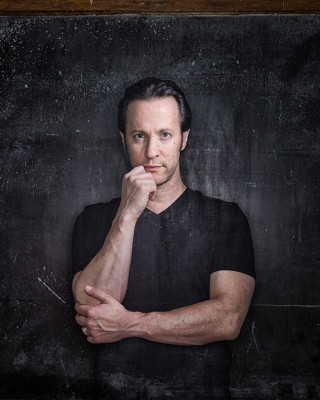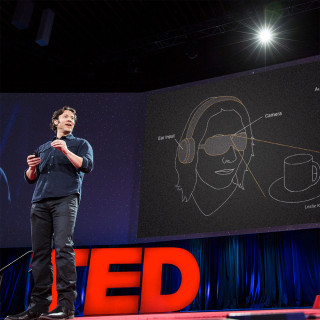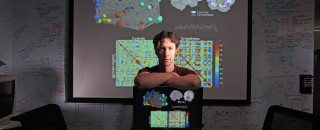What Does Artificial Intelligence Mean for Humans?
By Matt Pacenza
David Eagleman is here to defend the human brain.
Yes, what ChatGPT and other artificial intelligence technologies are doing is impressive. Yes, the list of what artificial intelligence can’t do is shrinking by the day.

Photo by Brian Goldman courtesy of David Eagleman.
But, the 52-year-old Stanford neuroscientist thinks that most people don’t realize how extraordinary and mysterious the human brain is—that 3-pound spongy mass of fat and protein he has spent his life studying and celebrating.
Eagleman will share his impressions of artificial intelligence at NHMU’s 2024 Lecture Series Keynote in a talk entitled, “What Does AI Mean for Humans? The Road to Augmented Intelligence.” The lecture takes place on Tuesday, April 2, from 7 p.m. to 8:30 p.m., at Kingsbury Hall. (Purchase tickets here.)
Eagleman wears many hats. In addition to his own research (he studies sensory substitution, time perception, vision, and synesthesia), he is a podcaster, a Guggenheim Fellow, a best-selling author of popular science books, and the founder of Neosensory, a company valued at over $20 million that makes wearable technologies to address conditions like hearing loss.
As the audience at Kingsbury will discover, Eagleman delights in helping lay audiences understand complex phenomena. As a 2011 profile of Eagleman in the New Yorker notes, he has “a gift for distillation and off-the-cuff analogy,” Those skills are apparent in his books—Wednesday Is Indigo Blue: Discovering the Brain of Synesthesia (2009); Incognito: The Secret Lives of the Brain (2011); The Brain: The Story of You (2015); The Runaway Species (2017); The Safety Net: Surviving Pandemics and Other Disasters (2020); and Livewired: The Inside Story of the Ever-Changing Brain (2020.)
Eagleman has also hosted two television programs: The first, The Brain with David Eagleman, ran on PBS and BBC in 2015, while The Creative Brain debuted on Netflix in 2017.
During his lecture in Utah, Eagleman will reveal a new idea he's been working on for months, a new method for testing the question of whether artificial intelligence can match or possibly surpass human intelligence.
The concept of such a test has been around for decades. It's a popular notion in science fiction. The best-known test was developed in 1950 by mathematician Alan Turing and bears his name. But as Eagleman will explain Tuesday, he believes the Turing Test and several other measures, such as the Lovelace Test, are now outdated. The Utah audience will soon find out what measure he believes should replace it.
Eagleman isn’t dismissive of artificial intelligence—he believes its ability to catalog and connect a vast array of scientific information will lead to significant discoveries in the coming years, among other advancements—but he also doesn’t think it approaches the human brain’s creativity and its ability to conceptualize the world. As he said during a mid-March interview, artificial intelligence is “a cartoonish version of neuroscience. It’s not a new theoretical advance. It’s computing power.” AI, Eagleman says, can do an extraordinary job of piecing together what is already known—but, he says, he doesn’t yet believe it can make new knowledge. He doesn’t believe it can imagine, it can foresee what is as yet unseen. These abilities, he believes, are at the heart of true scientific advancement and human creation.
"[Artificial intelligence is] a cartoonish version of neuroscience. It’s not a new theoretical advance. It’s computing power.”
Eagleman also points out that as much as artificial intelligence and robotics have leaped forward in recent years, they still can’t perform tasks that small children easily manage: handling small objects like morsels of food; navigating complex spaces like a room filled with furniture, or, as any parent well knows, using language and emotions to manipulate adults.

Photo courtesy of David Eagleman.
Other interesting examples of where artificial intelligence falls short? It has struggled to interpret Shakespeare, to write jokes and to solve certain mathematical word problems. Eagleman thinks these examples are significant, shining a light on the unique capabilities of the human brain, but he also acknowledges that anyone making predictions about artificial intelligence’s capabilities might soon feel foolish. A year ago, he attended a series of TED talks in which several claims were made about artificial intelligence’s limits. Each barrier has since been surpassed.
Even if artificial intelligence can produce creations that seem human, Eagleman believes that people will still demand products and art that are made by humans, or by nature. He gives the example of lab-grown diamonds, which are physically identical to natural diamonds. And yet the lab-grown cost only one-fifth of natural gems.
“We value nature’s version of it,” Eagleman points out.
Eagleman's takes on contemporary controversies—which are largely optimistic—stray beyond artificial intelligence. When asked whether he's concerned that widespread phone usage harms children and teenagers, as many folks believe, Eagleman says he's not that worried.
“It is like how we reacted when the printing press was introduced,” he notes. “Everyone felt it would be a disaster, and it was not.” He argues, instead, that we fail to recognize how much smartphones have improved contemporary human interaction. Rather than conversation stalling out over a dispute over an easily researchable fact or data, we can move quickly to more substantive discussions. “Having access to the world’s information has been an improvement,” he says.
Eagleman raised another current issue about artificial intelligence. He fears that even as the technology has extraordinary potential, it's becoming subject to corporate and political pressures that will diminish its potential. The recent release of Google Gemini was jeered when it appeared the product had been rigged to produce results that would appease more liberal consumers.
“I have an advanced sense of regret that we’re going to see a Balkanization of AI,” Eagleman said.
He worries that the more we allow artificial intelligence to become subject to the same tribal pressures that shape so much of American society today, the less effective it might be. “Pretty soon, we will have a chatGPT that doesn’t reflect the distillation of all human knowledge, but rather what a programmer thinks.”




